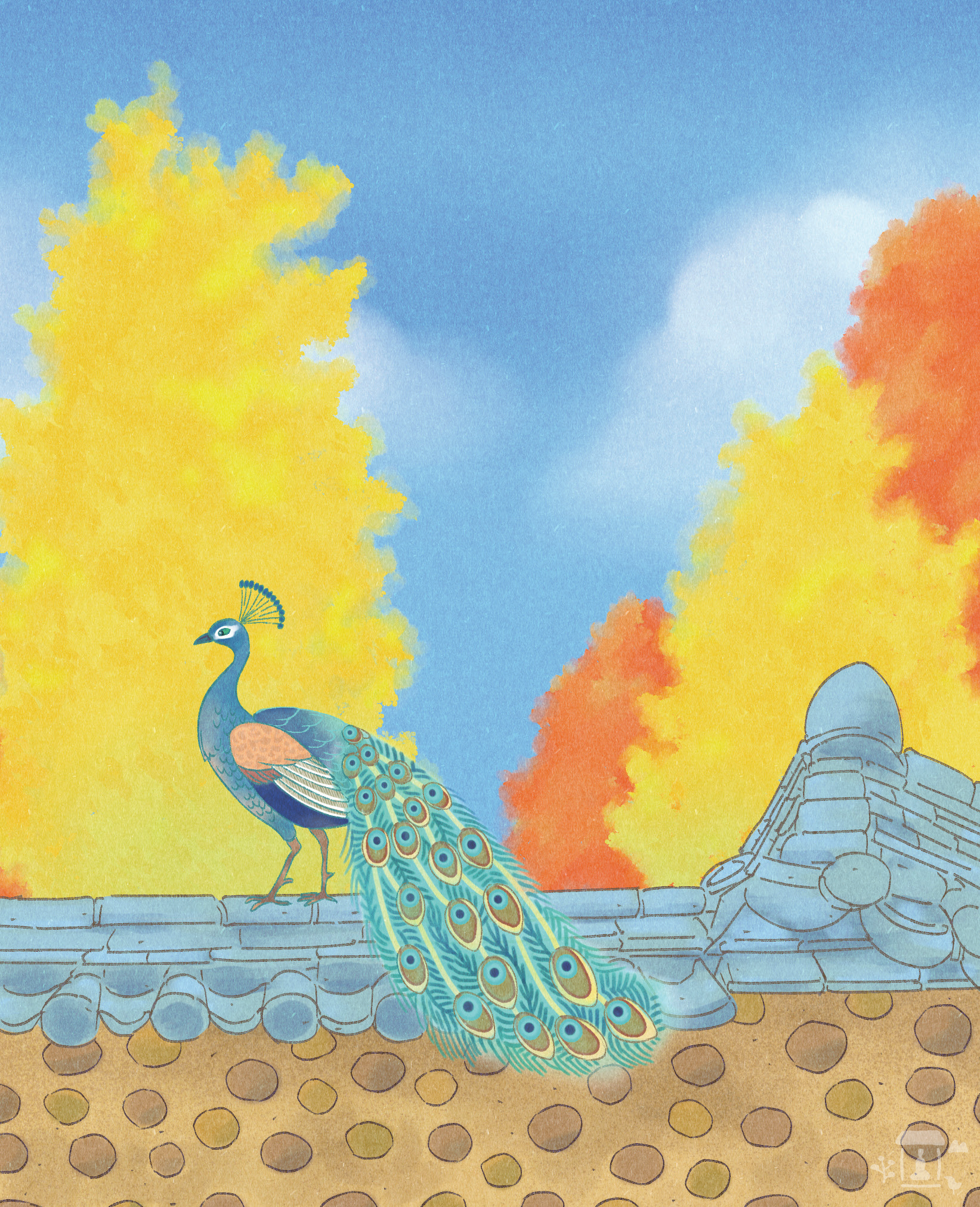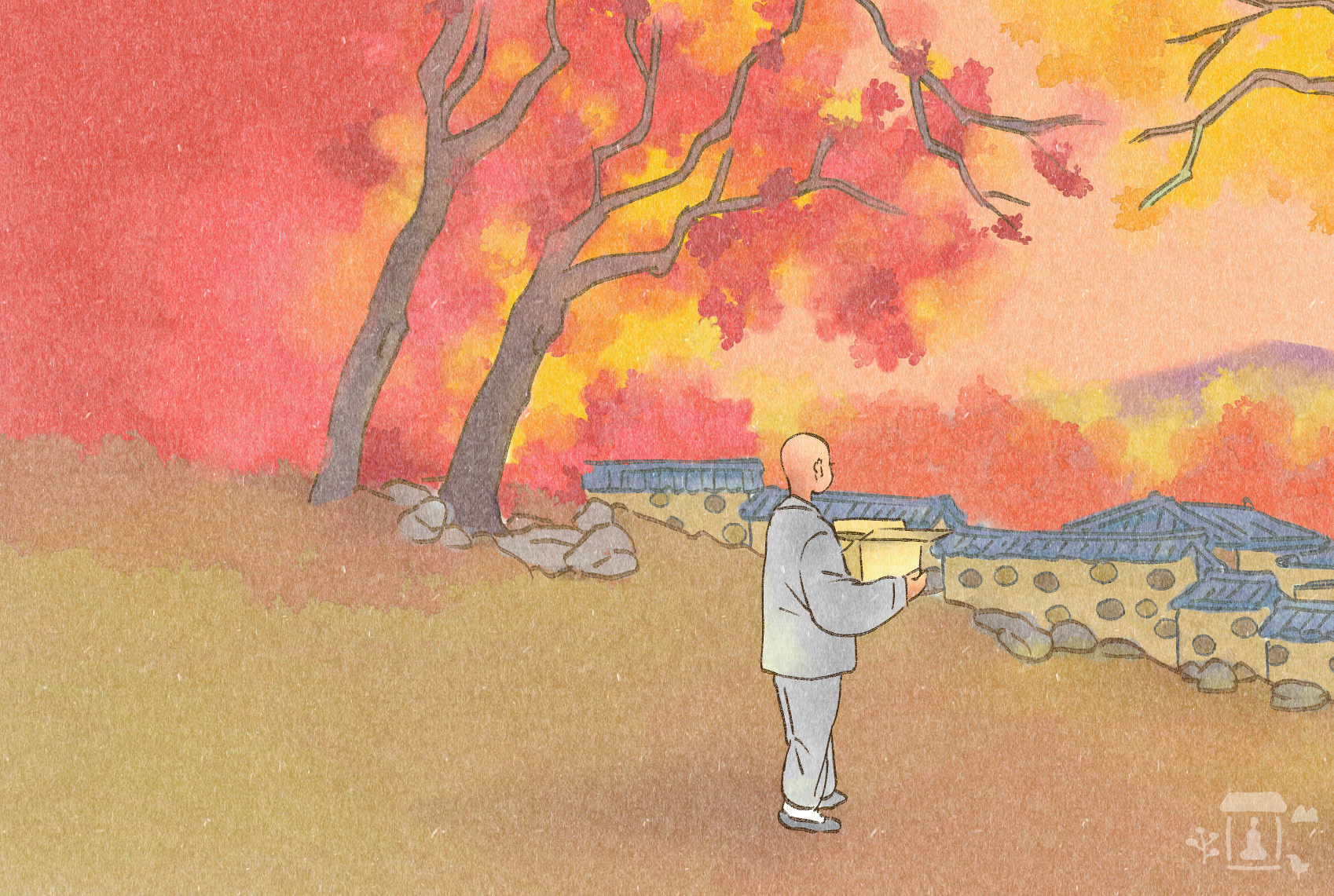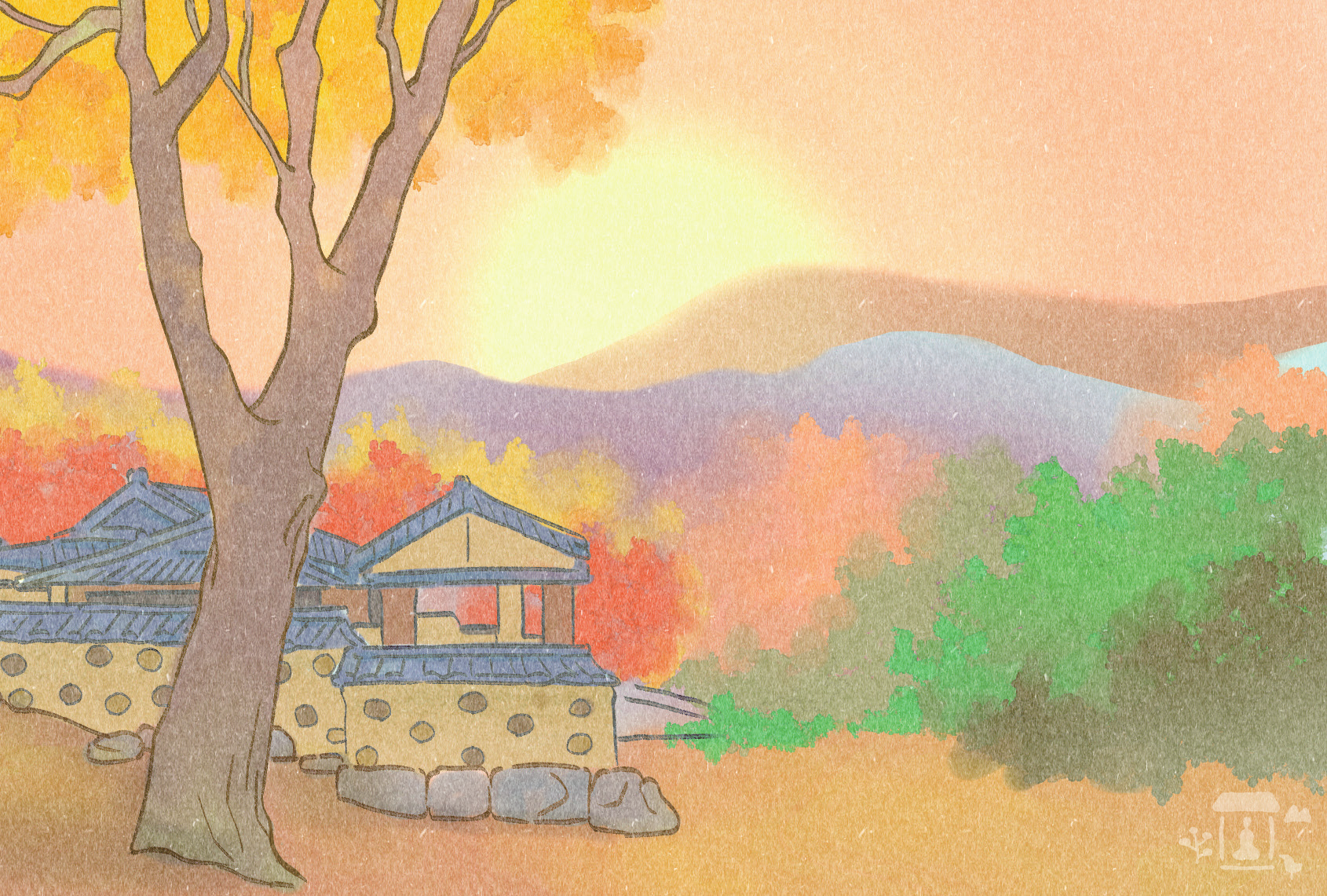Vivid

The Sound of Flowing Water
As the beginning of autumn approached, the wind felt different from morning to evening, and we hurriedly entered the final stage of our summer Seon retreat. Aside from the weather bureau and farmers, who else reacts so keenly to the changing weather as the monks and nuns in the Seonbang (Seon Quarters)? Even without a calendar, we sense the Soseo (Day of Lesser Heat) and Daeseo (Day of Great Heat). We sense the approach of Ipchu (Beginning of Autumn). Days pass tediously, with the temperature inside the Seonbang exceeding 30 degrees Celsius. As I gradually lose interest in consuming first melons, then peaches, and then grapes, I can sense the change of season. Large dragonflies begin to flutter across the veranda, and the buds of the crape myrtle blossoms burst open, signaling the arrival of autumn. And soon it’s time to depart. The pressure in my chest rises quietly. I diligently slice the watermelons in the fridge to serve for each meal, and I gorge myself on the dozens of ice cream bars left in the freezer. I wash my meditation cushion, now permeated with sweat and thoughts from the long summer retreat, and dry it thoroughly. I pull out the weeds and trim the bamboo shoots that stick up out of the ground here and there. I clean the window screens. I pack my bags. I rummage through the shelves and drawers in my room, organizing each item one by one. There are round pebbles and Asian supplejack nuts picked up on my walks, shards of glass, books I brought but never opened, bells I kept to ward off wild boars, apple juice and Orion Fresh Berry cakes I had gradually collected as I passed by the tea room, like a sparrow stopping by a mill to feed. Why have I accumulated so much stuff without any intention of saving them or any real use for them? Why do I have such a big collection of things? It’s not just about the objects. With things, we can take some, share some, leave some behind, or discard some. But processing our emotions seems a bit more complex. Does a desire to cherish a thing last forever? How rare is it that a desire to share is conveyed completely, without misunderstanding? Feelings we think we’ve left behind—those we think we’ve abandoned—often return and hang around like shadows, making their presence known. I truly longed for the retreat to end. Of course, there had been many happy days there. Early in the retreat, I injured my lower back, but as a result, I learned the necessary exercises to keep it fit, and I was able to sit on my meditation cushion with more stability than ever. The sunlight that filled the meditation room around 7:30 every morning was golden every day, and my still-drowsy eyes and mind were revitalized by the light’s undying brilliance. It was a joy even for someone who only sat as still as a stone. Sometimes, peacocks would show up outside the room and sing. Unlike their majestic appearance, their voices sounded terribly shrill. One day, as soon as the bell signaled the end of our Seon session, one senior monk sprinted forward as if to catch one. The scene of the peacocks soaring into the sky in unison was a memorable sight. There was always a Eurasian hoopoe in the yard, and I was secretly proud to be the only one who knew the name of that small bird, with its orange feathers raised on its head and its swift movements. “Oh, that bird? It’s a hoopoe,” I would proudly say. And someone would ask, “A hoodie?” I would sip coffee in the courtyard with the other practitioners, watching the hoopoe and looking over the lawn where the low clouds of the rainy season and the sound of rain gathered. Such a pleasant environment gave the coffee a luxuriously deep flavor. Even the return hikes back to our dormitory while being drenched in a sudden downpour had their own feeling of romanticism. And one day as I walked alone through the forest, I discovered a cluster of blue mountain hydrangea, a sight that filled me with ecstasy. And during this retreat, people lived with other people, an opportunity for a lot of words to be exchanged. Some people said I was kind, others found me disgusting. Some said I was naive, yet others found me scary. Some said I was too hasty, yet others found me a bit stuffy. Some said I thought too much, yet others found me comfortable. Some said I smiled too much, yet others said I was stiff. Some said I was transparent, yet others said I was inscrutable. To some, I was okay, to others, I was strange. Living with others is often never easy. But no matter how arduous it may be, it’s perhaps not as arduous as living with one’s own heart. No matter how many words flow between people, it was me who didn’t let them just flow past; I fixated on them one by one. I wanted to keep hearing pleasant words, and I desperately wanted to sift out the unpleasant ones. I recorded them in my mind and kept filtering them. In this way, I gave up my peace of mind voluntarily. I gave up the joys of my pain-free back, the golden sunlight, the peacocks and hoopoes, the sound of rain, the delicious coffee, and the blue swaying of hydrangeas hidden deep in the forest. I’ve met many people this season, but I’ve encountered even greater things in my own heart. Through positive words, positive situations, and positive people, I’ve experienced even more feelings of love and the desire to maintain what I love. Through negative words, negative situations, and negative people, I’ve experienced even more feelings of dislike and the desire to avoid those things. It’s been hard work and exhausting, but I still have no idea how to deal with my own heart.

When I climbed the hill along the main road that skirted the Seonbang, the panoramic view quickly revealed itself. The view was expansive. On my right, a gently sloping ridge stretched far into the distance, and on my left, a mighty mountain range—too powerful to be captured in a single frame—loomed. Ahead lay a breathtakingly expansive landscape, with the Seonbang peeking out below. Before the retreat ended, I climbed this hill again and gazed silently at the scenery. On an evening filled with the sound of a deep blue breeze, the Seonbang—once a place of shared living and conversation—now seemed incredibly humble. Embraced by the desolate silence like a black-and-white photograph, however, the tension I felt at the Seonbang was nothing more than a young face with a half-baked smile. I and my thoughts silently pondered those feelings. I felt like I understood a little. I should not try to deal with those feelings; I should just let them be. Let things come and go, including words, situations, and people. And let my heart be reflected in them.

I ended up with four boxes of stuff. I kept the pebbles and discarded the Asian supplejack nuts. I shared the apple juice and ate the Orion Fresh Berries. The fate of my accumulated feelings is now unknown. And as I departed through the One Pillar Gate, relieved at the longawaited closing day, I failed to keep my promise not to look back. The road was beautiful, and above all, I felt a need to express my thanks to everything that had taught me, both joyfully and arduously, and to everything that had illuminated my heart.





